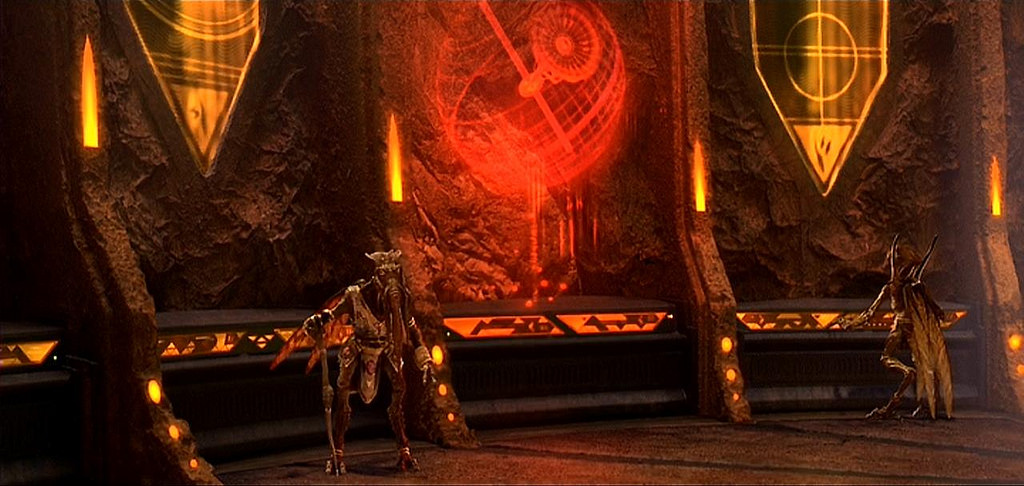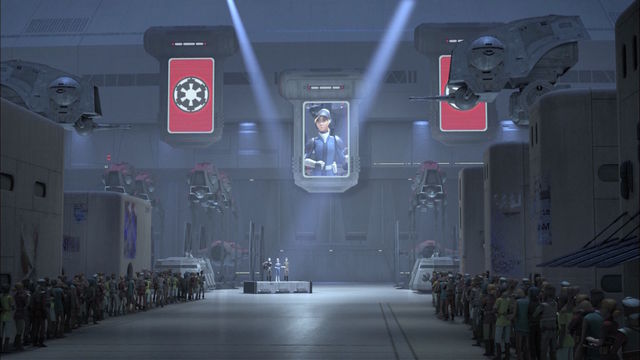
This article was sparked off by regular ETE commenter John, in response to the Fantasy Foresight piece that considered how simply killing all Imperials would have been insufficient to stop the Starkiller. What might these shadows be? And how do they play into that superweapon’s development? At the risk that the impending book Bloodline will blow up most of this, let’s consider a few possibilities.
First, the elephant in the room – that the New Republic was caught napping by the Starkiller. Would a government set up by those that destroyed Death Stars really be so spectacularly lacking in vigilance? The answer has to be probably not, but what of time eroding that? A decade on, the need to keep an eye out for threats would have reduced – likely certain politicians would be making political capital out of efficiency measures that reduce the spend on such monitoring. Two decades on? The deck tilts further towards no need for it. Add even more years in and…
Yet, if there’s one thing the Clone Wars should have taught the NR it’s the need to keep an eye out for potential enemies, as they only saw the Confederacy of Independent Systems by the time it was an impending onslaught, which in turn opened the door for the Grand Army of the Republic – as if someone planned it – which may be the longer shadow of the Clone Wars, that Sidious manipulated and subverted the entire system with the willing cooperation of those running it! Nor did it stop there: Over the twenty years that led up to the original trilogy, the executive arm of government continued to amass power so that by the time the Death Star was operational the legislative arm, the Galactic Senate, could be disbanded without significant opposition.
So say the Starkiller threat had been spotted? Chances are it would have been deemed dubious, either fraudulent or a coup in the plotting due to Sidious’ pre-Empire activity.

The Clone Wars’ biggest shadow is easily that of the Empire and its toxic legacy to the galaxy. Yes, it collapsed rapidly once its ability to apply coercive force at the galactic level went up in smoke, but it did not come out of nowhere. The genius of the Clone Wars was that they were not only a way of destroying the Jedi, but also a means of subverting and corrupting the galaxy into a pro-Imperial mindset: that all the system needs to work is no opposition or disagreement. Where did that come from? The Old Republic’s inability to operate effectively because it was paralyzed by interminable debate and procrastinating politicians, who were clearly being paid by the hour!
Mon Mothma’s intent to demilitarize the Republic once hostilities with the Empire cease has been damned as fool idealism, but is it? The galactic military was the main tool of Imperial control. It is very likely that once the war with the Empire is won there will indeed be a major rejection of it on a galactic level. So is Mothma really engaging in idealism or a more hard-headed political realism that says the Senate will never back major military funding in peacetime? That’s without adding in that the last time there was a military proposal for the Republic it was put through under the threat of CIS invasion.
In political terms, there’s an odd void in Star Wars. There was the Galactic Senate, with the chancellorship, so that covers the legislature and the executive functions. What of the judiciary? A handful of times Legends did court-martials and other legal processes, but those differ from the role of the highest level court, which has the ability to adjust the law. If there was such a court, it is certain that Sidious would have acted to liquidate or curtail it. Should there be such a court in the New Republic? Absolutely. The concept of a judiciary able to amend or even strike down unjust laws recognizes there must be limits to what the other arms of government can do. That there are matters that should not be dictated to by elections and popularity alone, there needs to be an impartial body that sits outside of the party political structures. Yet even if Mothma proposed such, it is likely that Sidious’s shadow would still taint it.
What then is the solution in the face of this all-encompassing and total corruption by the Empire that the Clone Wars spawned? Too often people set up the good and the perfect as enemies; it is not sufficient to have something that is merely better than what came before, it must be perfect. In the face of the wounds inflicted, just bandaging will suffice and may have to do for years. Might that in time see the wounds heal? Hard to say – those wounds were accrued over decades, it may require the same for their healing. In most cases, however, the patient has to work towards their recovery and wish to be better. Is this the case for the SW galaxy? Of this, I’m skeptical.
There’s a reason Harry Truman’s use of ‘the buck stops here’ stood out and still resonates across the decades. The reason is it rarely ever happens, especially in politics. The more unpalatable truth, however, is that yes, we do get the politics we deserve because who votes the politicians in? One of the aspects of representative democracy that has been diminished over the years is that representative element. Not least as being representative of people means decisions are made on their behalf, which in turns carries with it a degree of responsibility. This is why the line ‘I didn’t vote for the bastard’ will sometimes be used, for people wish to disavow themselves of that electoral responsibility.
One of the most interesting and sadly too quickly ended plots in Destiny’s Way, a late New Jedi Order book, was around senators known to have flouted their responsibilities and betrayed their constituents. Unfortunately, the plot strand never went anywhere and it should have. What happens when that political contract breaks down? It tends to be messy and violent. (Can that be warranted? Depending on the details, but that’s a separate can of worms.) It is to the benefit of those who game the systems that those who vote do so from a position of information asymmetry, where the politician knows more than those voting.
As a certain infamous politician and later dictator once put it: What is to be done? Perhaps the only solution is a recognition that matters are indeed at rock bottom, that the systems were irrevocably abused, tainted and wrecked. Why does this matter? Because once that recognition is done, activity can move to clearing away the wreckage and work can then start on something new. If nothing else, doing something beats doing nothing.

Enjoyed this piece! We’ll definitely have to see how things develop as more new material is released.
I think one of the biggest losses of the shift to the new canon is the history of Admiral Ackbar. In the old Legends Clone Wars comic books, it was revealed that Ackbar was actually a separatist during the Clone Wars. I always thought that was one of the most interesting and unexpected pieces of character development in Legends. It begged all sorts of fascinating questions about the background of the movie protagonists. It hinted at a larger offscreen reconciliation between former Separatists (like Ackbar) and former Loyalists (like Mon Mothma) to build the Alliance to Restore the Republic. I wish that Legends had had the opportunity to explore that period and that process of reconciliation in more detail. What sorts of compromises did it entail for each side? How did the Alliance convince former Separatists to join the cause of “restoring the Republic”? How was the vision of restoration influenced by the presence of powerful former Separatist figures? Even if it was never explored in detail, it hinted at a much more complex political narrative unfolding behind the scenes, one that was at the same time both “realistic” in its complexity but also hopeful in its vision of reconciliation – by the Battle of Endor, Separatists and Loyalists (and, if you count Madine, even former Imperials) are standing side by side in their common quest to defeat the Empire and restore justice to the galaxy.
Unfortunately, the new canon decided to feature Ackbar as a hero-of-the-week on “The Clone Wars” TV show, fighting alongside the Republic against a Separatist invasion of Mon Calamari. Ackbar was reduced to just another generic “good guy,” a natural ally of the future Rebel Alliance rather than a problematic one. A lot of pretty questionable material was wiped away by the shift to the new canon, but the rewriting of Ackbar’s character struck me as one of the more profound losses that accompanied the transition.
All of which is to say, I hope that in the new canon the Separatists haven’t just disappeared. After all, a good chunk of the galaxy was fighting for its independence from the Republic during the Clone Wars, which it turns out were only about 20 years before the Battle of Endor. Whether or not those Separatists ended up rallying to the banner of the Alliance (as Legends Ackbar did), the destruction of the Empire ought to bring about their re-emergence: after all, as you note, the major political justification of the Empire was that it prevented Separatism. And assuming that the Empire didn’t kill every last one of them, there should still be Separatists around. Mon Mothma and Ackbar are still alive, so it stands to reason that a Rush Clovis or a Lux Bonteri might also still be alive. This is actually one area where the New Canon could significantly improve on Legends; after all, the foundation of the Legends New Republic ignored Separatism, because the Prequels had not yet been released! With the Empire gone, it stands to reason that Separatism would re-emerge as a political force, barring some major concessions by the New Republic. If I were a Separatist who had seen my world brutally conquered and exploited by the Empire, then I would be *very* suspicious of any “New Republic” that tried to take the Empire’s place. As you note, I think that New Canon Mon Mothma’s actions can only be understood in the context of a longer view of galactic history.
I really hope that the New Canon won’t forget the Separatists, as I think their continued salience provides a basis for political drama that goes beyond the simpler questions of “democracy” vs. “totalitarianism” that the movies explore. I guess we’ll get a better picture when Bloodlines comes out!
P.S. – Although NJO was not my favorite, *so much* was lost in the transition to Dark Nest and LotF! Where did the Vong go? What about the Bothans? How to rebuild the galaxy? It still rankles…
You’re far from the only one on the NJO consequences – or rather the lack of!
Clearly I need to reread DHC’s CW stuff as I’d forgotten Ackbar’s history completely, which does raise a number of Qs when you extrapolate onwards.
So, a quick check has revealed that Ackbar was not in fact mentioned explicitly in the “Clone Wars” comic that I was thinking of – it instead has a “Commander Merai” and a number of unnamed Mon Calamari fighting against the Republic over Kamino (in the series “The Defense of Kamino,” which can be found in Volume 1 of the Clone Wars Omnibus). I must have assumed that Ackbar was one of them, until the later “The Clone Wars” material included pro-Republic Mon Calamari led by Ackbar. I think my general point about how compelling the earlier idea of the Mon Calamari as Separatists still stands, even if Ackbar himself is not explicitly mentioned in the comic (he’ll still always be one of the aides on Merai’s bridge to me 🙂 ).